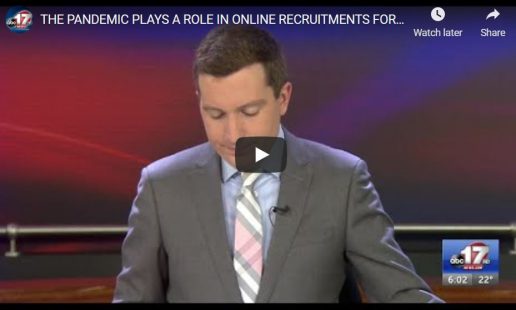ABC17news: Coronavirus pandemic increases human trafficking
The coronavirus pandemic has exacerbated the problem of human trafficking. According to the U.S State Department, an estimated 24.9 million adults and children are subjected to human trafficking around the world, including in the United States.
The COVID-19 pandemic has played a role in the increase of online recruitments for traffickers, experts say.
According to the Polaris Project, a non-profit organization that works to combat and prevent sex and labor trafficking in the U.S, during the COVID-19 lockdowns, the internet was reported as the top recruitment source location for all forms of trafficking.
The Polaris Project found that Facebook and Instagram were the most notable sites for recruitment into trafficking. There was a 125% increase in recruitments on Facebook over the previous year and a 95% increase on Instagram.
For the past 12 years, the State Department has dedicated the month of January to raising awareness about human trafficking and educating the public about how to identify and prevent this crime.
Human trafficking involves the use of force, fraud or coercion to obtain some type of labor or commercial sex act. Traffickers will look for the most vulnerable, someone who may need a physical need such as a safe place to stay or a hot meal, experts say.
During the pandemic, children and teenagers became more vulnerable emotionally and while be isolated social media became their only way to social connections.
A human trafficker will offer an individual something that they are in need of or want.
Nanette Ward says of the Missouri Human Trafficking Coalition, “If they’re lonely, or if they want a boyfriend, somebody who says you’re beautiful, somebody who says we can meet up and I’ll buy you gifts.”
Ward says there are a number of things parents need to be on the lookout for.
“Seeming to have more time on social media, that might mean they are hooked onto somebody in particular,” Ward said.
The Missouri Human Trafficking Coalition also says to pay attention if your child stops seeing their friends, if their behavior changes in anyway, if they start dressing differently or even starting to talk differently.
Other times, a trafficker may look for someone who is homeless or looking for love, belongingness or a sense of family. Traffickers might use violence, manipulation, or false promises of well-paying jobs or romantic relationships to lure victims into trafficking situations.
Victims of human trafficking at times are trafficked by someone they know such as a family member or a significant other. In 2019, 21% of victims were recruited by a family member or caregiver. That increased to 31% in 2020. The proportion of victims recruited by an intimate partner increased from 22% in 2019 to 27% in 2020.
In Missouri, according to the Polaris Project, in 2020 there were 750 contacts and 267 situations of human trafficking called into the National Hotline for Human Trafficking. 185 of those calls were directly from victims of survivors of human trafficking
If you or someone you know is or was a victim of human trafficking and are in need of help you can contact the Polaris Project at 1-888-373-7888 or text “BeFree” to 233733.
Services are available toll-free 24 hours a day, seven days a week.

About the author